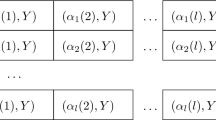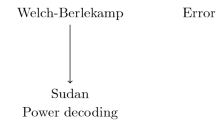Abstract
Permutation codes have been studied because of a potential application to powerline communication. Efficient decoding in this application requires the existence of some structure in the permutation code. Many of the largest permutation codes known are unions of cosets of a nontrivial permutation group, and it is these codes that are the main subject of this paper. In the case when the code consists of a single permutation group, Bailey has developed an efficient method of decoding when the received word is affected by errors. This work is extended in three ways in this paper. Firstly, it is observed that the types of error occurring on a powerline channel lead to a mixture of errors and erasures. Further, some of the erasures may have an associated small candidate list of possible values, providing more information than simply treating them as erasures. Bailey’s algorithm is modified to deal with mixtures of errors, erasures and candidate lists. Secondly, the algorithm is extended to codes which are unions of cosets of a group code. Thirdly, it is observed that using nearest neighbour decoding it is often possible to uniquely decode received words beyond the guaranteed capability of the code given by its minimum distance. Extra information may be available in candidate lists, and it is shown how this can aid decoding.
Similar content being viewed by others
References
Bailey R.F.: Error-correcting codes from permutation groups. Discret. Math. 309, 4253–4265 (2009).
Bailey R.F.: Permutation groups, error-correcting codes and uncoverings. Ph.D. Thesis, University of London (2006).
Chee Y.M., Purkayastha P.: Efficient decoding of permutation codes obtained from distance preserving maps. In: Proceedings of the IEEE International Symposium on Information Theory (ISIT), Cambridge, MA, 1–6 July, pp. 636–640 (2012).
Chu W., Colbourn C.J., Dukes P.: Constructions for permutation codes in powerline communications. Des. Codes Cryptogr. 32, 51–64 (2004).
Gordon D.: La Jolla covering repository. http://www.ccrwest.org/cover.html (2013). Accessed 15 Jan 2013.
Smith D.H., Montemanni R.: A new table of permutation codes. Des. Codes Cryptogr. 63(2), 241–253 (2012).
Smith D.H., Montemanni R.: Permutation codes with specified packing radius. Des. Codes Cryptogr. 69(1), 95–106 (2013). doi:10.1007/s10623-012-9623-4.
Swart T.G., de Beer I., Ferreira H.C., Vinck A.J.H.: Simulation results for permutation trellis codes using M-ary FSK. In: Proceedings of the 2005 International Symposium on Power-Line Communications and Its Applications, Vancouver, Canada, 6–8 April, pp. 317–321 (2005).
Author information
Authors and Affiliations
Corresponding author
Additional information
Communicated by C. J. Colbourn.
Rights and permissions
About this article
Cite this article
Hunt, F.H., Perkins, S. & Smith, D.H. Decoding mixed errors and erasures in permutation codes. Des. Codes Cryptogr. 74, 481–493 (2015). https://doi.org/10.1007/s10623-013-9872-x
Received:
Revised:
Accepted:
Published:
Issue Date:
DOI: https://doi.org/10.1007/s10623-013-9872-x




